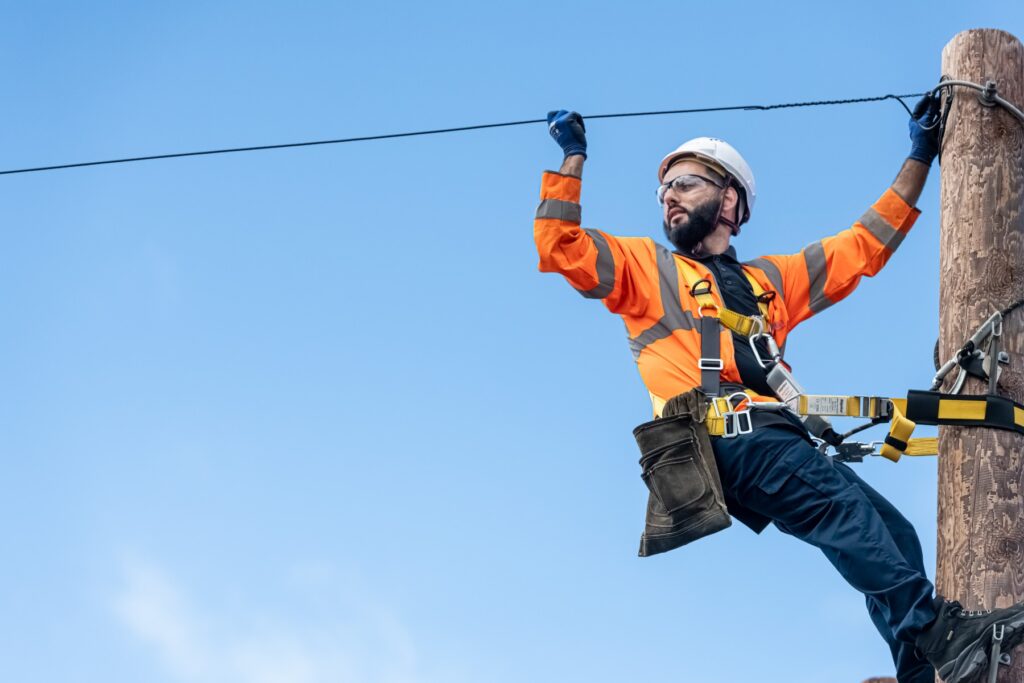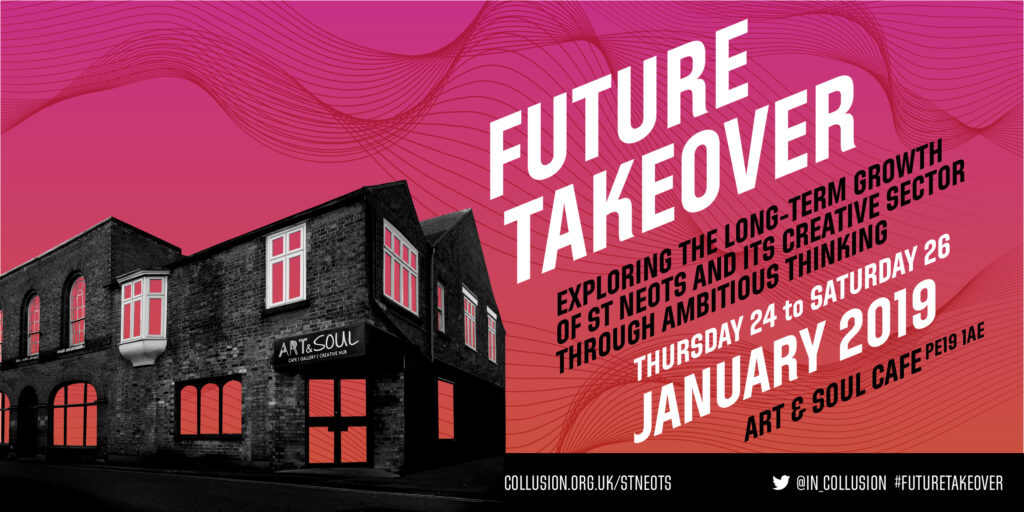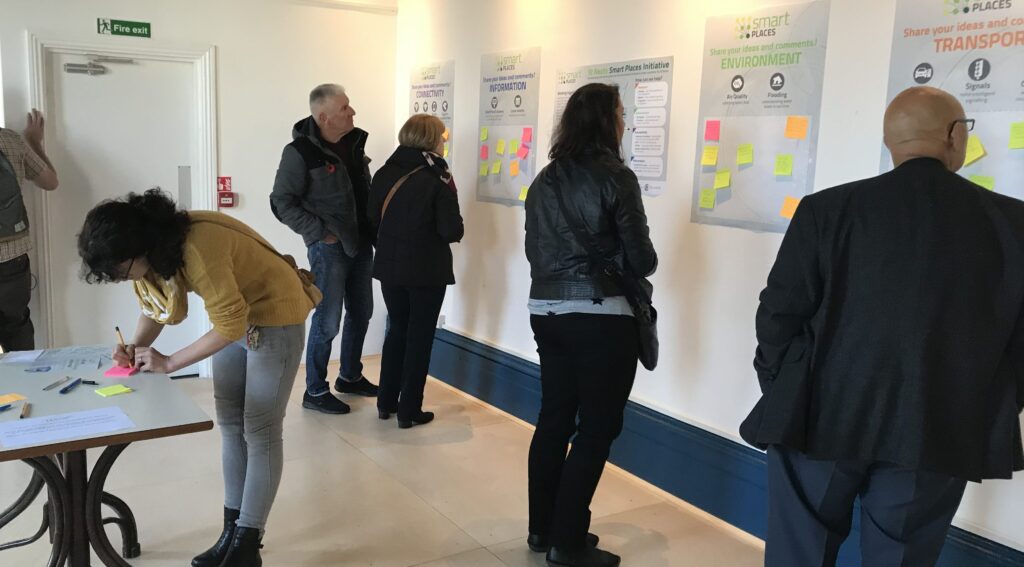#hackCambridge
We set up #hackCambridge to begin to engage citizens and the local tech community in the role that technology can play in helping to address the Cambridge’s challenges. The event was a collaboration between Cambridgeshire Insight http://www.cambridgeshireinsight.org.uk/, Collusion http://www.collusion.org.uk/ , Thingful https://thingful.net/ and The Junction http://www.junction.co.uk/ as well as the University of Cambridge. We wanted to get people using the data that is available and so we ran a 24hr Hackathon. We also wanted to get the residents of Cambridge involved in thinking about some of the issues that ‘Smart Cities’ raise as well as discussing ideas. So we ran three talks and a discussion as well as bring the Collusion commissioned ‘Data Shadow’ instillation to The Junction. The event was part of the ‘Festival of Ideas’
24hr Hackathon
Data has been called the new oil of the digital economy. Local authorities already collect a huge amount of data but it tends to be locked away in systems and can’t be reused by app developers and citizens. The County Council is part of a partnership called Cambridgeshire Insight which is looking to break this data out of its silos and to publish it as ‘Open Data’. By doing this we hope to become more transparent but to also stimulate innovation, with the data being used to create tools which help address some of the challenges that the city faces. The hackathon was set up to begin see how ‘open data’ could be used.
Having never run an event like this before we wanted to co-create the hack, making sure that it was interesting and engaging for those involved but that it also would give the opportunity to create tools which could be used and have longevity beyond the event. We held a meet-up in advance and discussed, the challenges teams wanted to work on, format of the event and venue requirements. These were the key points;
- Wanted it run for 24 hrs – give teams ample opportunity to be able to work on solutions. Something that ran over a number of weeks would be too time consuming.
- Broad range of challenges – we had discussed concentrating in one or two areas but participants wanted a range of challenges.
- Data – need a good range of data, that was easily accessible and that was clean.
- Excellent connectivity
So on the 31st of Oct we brought approx. 20 people together at The Junction gave them an overview of challenges and data available http://www.connectingcambridgeshire.co.uk/smartcambs/resources/, fed them on Pizza and gave them 24hrs before they pitched to a panel of judges and this is what they came up with;
The Pitches – https://goo.gl/vXLWT5 (watch them here)
We had 8 teams pitch some had used data but other just pitched ideas. The ideas that used data were;
Map Visualisation – They visualised data that had been released such as traffic count data, crime statistics and then visualised it onto Google Maps making it easy for people to understand and use.
Cycle Streets/Planning Data – Cycle streets presented two ideas that they had worked on over the two days of the hack. The first looked to help give greater granularity to some of their displayed data by exploding grouped data into more detail. The second addressed an issue that the campaign and others have identified. The various planning systems that councils use for planning applications make understanding what planning applications are live in a current area difficult. The proposal scraps planning data and then allows you to easily search by an area and see live applications – parameters can be set which allows you to filter out applications for tree works etc. This would help campaign groups and citizens to engage more fully in the planning process – http://www.cyclestreets.net/
‘Why don’t we take the bus to work’ – Used the historic bus data that the University presented and looked at journey times on specific roads. It then looked to see whether there was any correlation between the two. One of the conclusions was that journey times tend to be irregular and it is this irregularity which could put people of using them as they never know how long they will take. This project shows what can be done with limited data but also shows that with a richer data set (and more time) much more could have been achieved.
Motion Map – Building intellect have been working on the Milton Keynes Motion Map which visualises transport data to inform transport choices. They came to the hack to begin to use the available transport data to populate a Cambridge map. The more and richer the data the better this tool can be and the more intelligent transport choices people can make – http://www.buildingintellect.co.uk/
Crowdsurf – The basic premise of Crowdsurf was that if you can’t get the data you need to solve a problem collect it yourself. The basic problem that Crowdsurf looked to address was how can you avoid crowds in Cambridge? The team looked to use Radio-frequency (RF) profiling to pick up the density of mobile phone signals and then to display them as a heat map which gives an indication of crowds. This would look to build up a map of the city and could through a mobile device show quite routes and areas.
Citi Pulse – Was a proposal to build a platform for better engaging citizens allowing a more meaningful dialogue – giving better opportunities for citizen ideas to be developed, give and visualise data in a more meaningful way and to create dialogue through city screens.
There were also two more esoteric pitches ‘not a vision’ which pitched a monorail and a 3D Jigsaw puzzle for blind people.
The judging panel deliberated and in the end ‘map visualisation’ won for its easy to use and understand visualisations.
Next steps – The hackathon showed the power of putting data into the public domain. By bringing residents, the tech community, the public sector and the creative sector we can start to develop tools and visualisations which can begin to improve the quality of life for residents and in the case of things like cycle streets and motion map really begin to impact on some of the major challenges around congestion. So we need more collaboration, more data and co-creation and an open approach to innovation to help Cambridge address its challenges.
Talks and Discussion;
‘Cambridge – toward a smart city’ – This is the beginning of an on-going conversation on how we can use technology in the city, particularly how that can be citizen driven. It also begins to examine some of the issues that surround ‘smart cities’ particularly around the collection and use of data. (Thanks to Antony Carpen for videoing)
Cllr Lewis Herbert (leader of the city council) – Lewis talked about the challenges Cambridge faces particularly transport.
https://www.youtube.com/watch?v=-wgCKmlSDIc
Usman Haque (Umbrellium) – Usman talked about citizen participation
https://www.youtube.com/watch?v=LmUuEx4lXYQ
Mark Farid (Data Shadow) – Mark talked about ‘Data Shadow’ and some of the issues around data privacy and security.
https://www.youtube.com/watch?v=hXs2zXeqoGk
Data Shadow/Maker Challenges
One of our collaborators Collusion have led discussions around ‘Smart Cities’ in Cambridge and also ran a ‘Maker Challenge’ which saw teams develop solutions. We had a couple of these on display, Cambridge in Minecraft and a project looking at the market square http://www.collusion.org.uk/Maker-Challenge
Data Shadow – Which aimed to make the public question the privacy they sacrifice by using an internet connected mobile phone using apps, cloud storage services, and social media. Just what are you agreeing to share? Data Shadow was an individual experience (one participant at a time), taking place in a 8 x 2m shipping container in central Cambridge. During their journey through the container, the participant came face to face with their own, personal data shadow. http://www.collusion.org.uk/Commission
What next?
We hope to run more events and are interested in hearing from anyone who would like to collaborate with us. We want this to be the beginning of an ongoing engagement with residents in an attempt to create a truly citizen led ‘Smart City’ model.
Related Posts

Critical telecoms work continuing during Coronavirus pandemic

‘Future Takeover’ for St Neots

